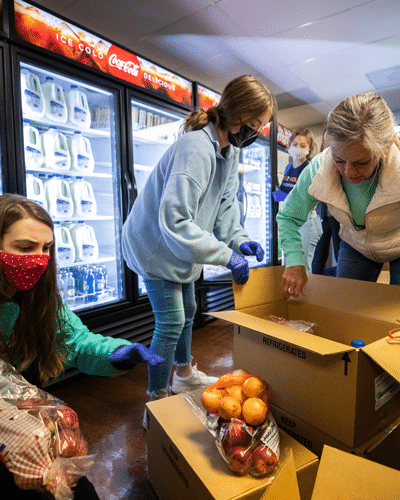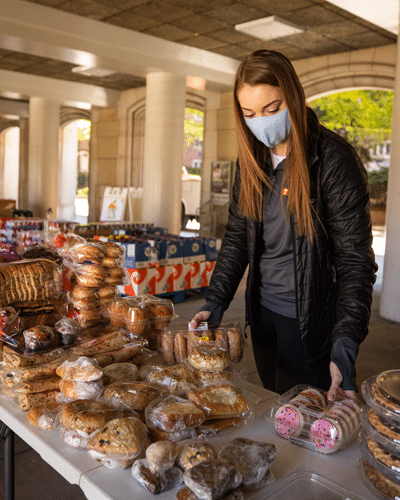
The University of Tennessee, Knoxville, has a new resource to help ensure no student struggles with food insecurity during their time at the university, leaving them free to focus on learning, growing, and discovering a path for their future. Establishing the Big Orange Pantry has been an effort by antihunger campus groups comprising students, faculty, and staff devoted to using their expertise to solve the problem together. The result is a pantry for students that seeks to destigmatize food need and be a readily accessible source of nourishment.
We’re Volunteers, and so we’re going to volunteer to solve this problem. We’ll get it solved.
– Donnie Smith (’80)
Seed Funding Makes Pantry Possible
Funding for the Big Orange Pantry came thanks to the generosity of Donnie and Terry Smith (’80). An animal science program graduate and former president and CEO of Tyson Foods, Smith is a member of UT’s Board of Trustees and a highly active philanthropist in the area of hunger. Smith described his life story and involvement with hunger philanthropy in a recent conversation about the End Hunger/FEED Change initiative at the UT Institute of Agriculture.

“When this started, I had no idea we didn’t have a full-time pantry,” Smith said. “It was kind of a situation where I said: ‘Not on my watch.’ So, Terry and I put down some seed money to get it started and stocked. Fortunately, through the networks being established, we’ll be able to keep it stocked.”
Smith, who devotes a significant portion of his time to hunger issues in Africa, added that the United States economy can also leave people hungry, although it might not be readily apparent. As a student from an average, middle-class family, he himself experienced times when his funds ran out and a few days were spent living off potted meat and saltine crackers.
“It’s really hard to ace a math test when you’ve got an empty stomach,” Smith said. “Our hearts are with that kid who needs that bit of extra help to do well in school and not get discouraged. It’s hard to raise your hand and say, ‘I’m hungry. Someone feed me.’”
Smith believes that the stigma surrounding food insecurity leads to lower graduation rates because hungry students may give up and choose to return home for a job and steady paycheck. Recent research shows that one in four students across the UT system are food insecure.
“I really didn’t have any idea that so many students are food insecure,” Smith said. “Now I know, and I want to do something about it because I can. If you can, you should, and giving UT a boost can lead to people flocking around the idea of helping these kids have food so they can do well in school. We’re Volunteers, and so we’re going to volunteer to solve this problem. We’ll get it solved.”
Cross-Campus Involvement
Much of the vision for the Big Orange Pantry was developed in an interdisciplinary manner, with diverse members of the Volunteer community bringing their expertise to the table. For instance, students and faculty from the Department of Nutrition and the UT Culinary Institute are advising on healthy choices, the College of Social Work is creating a network of partnerships with local food banks, and the Department of Supply Chain Management is involved in the logistics of stocking the pantry.

Shea Kidd Houze, associate vice chancellor for student life and dean of students, said that the Big Orange Pantry will be the culmination of years of work which has yielded a plethora of initiatives to address food insecurity on campus. Now, with the pantry in place, all of those initiatives will share a hub.
“As Maslow’s hierarchy reminds us, when basic needs like food, clothing, and shelter are not met, it is difficult to focus on anything else,” Kidd Houze said. “The creation of the pantry will hopefully alleviate concerns of students wondering where they will access their next meal.”
Kidd Houze added that the need for food support has grown in recent years. Smokey’s Pantry, which is located on campus and open to the general public, is operated by an outside organization and only open for limited hours. However, data collected by Smokey’s Pantry proved key to moving the anti-hunger initiative forward. The need for a full-time pantry was evident.
“We were fortunate to connect with Donnie Smith who had an interest in this initiative, and we are grateful for his and Terry’s generosity,” Kidd Houze said. “Their love for Tennessee has been evident in various aspects of our campus, and this is another tangible example of the Volunteer spirit at work. Our hope is that we are able to continue to grow the Big Orange Pantry Fund as an avenue to support and sustain the Big Orange Pantry and food-insecurity initiatives.”
A Welcoming, Accessible Experience
Abigail Brumfeld, who serves as an assistant director in the Office of the Dean of Students, coordinated significant parts of the Big Orange Pantry in her role as a co-advisor for Student Government Association. She was responsible for bringing together many campus constituents who shared their expertise and resources.
One feature of the pantry Brumfeld highlights is the possibility of a grab-and-go meal option. Under the plan, the Office of Sustainability and the Culinary Institute would reclaim food from the dining halls and make grab-and-go meals available at the Big Orange Pantry.
“We want the pantry to be a place where people don’t feel stigma, but feel like it’s a shopping experience instead,” Brumfeld said. “Much of this will be client choice, and I’m excited because we’ve got some really smart people working together.”
One of those people is Ashlyn Anderson (’22), who is studying food security and public health nutrition under the guidance of Betsy Anderson Steeves, assistant professor of public health nutrition at UT.
“My passion for addressing food insecurity among college students started when I saw data collected by Professor Steeves,” Anderson said. “The data shows the magnitude of this issue on campus, and I think the pantry has an enormous amount of potential for unifying the antihunger movement at UT. I envision it being completely de-stigmatized and normalized for use at any time. Getting food support shouldn’t be something students feel alienated about, and this will be available as they work hard to obtain higher education.”
Anderson echoes the sentiment of many others involved in the project when she says food insecurity defies stereotypes: it is impossible to know based on a person’s appearance whether they have enough to eat. That, in and of itself, is a reason for Volunteers to be active in their community.
The Big Orange Pantry opened in October in Greve Hall with systems in place to comply with social distancing. It is open Monday, Wednesday, Thursday, and Friday with online ordering and in-store pickup. Future plans include the continued client-choice model and offering an onsite shopping experience.
